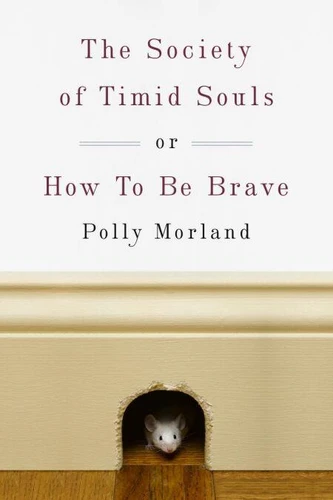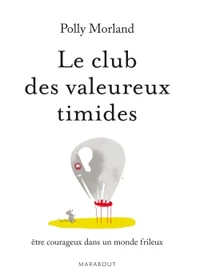The Society of Timid Souls. or, How To Be Brave
Par :Formats :
Disponible dans votre compte client Decitre ou Furet du Nord dès validation de votre commande. Le format ePub protégé est :
- Compatible avec une lecture sur My Vivlio (smartphone, tablette, ordinateur)
- Compatible avec une lecture sur liseuses Vivlio
- Pour les liseuses autres que Vivlio, vous devez utiliser le logiciel Adobe Digital Edition. Non compatible avec la lecture sur les liseuses Kindle, Remarkable et Sony
- Non compatible avec un achat hors France métropolitaine
 , qui est-ce ?
, qui est-ce ?Notre partenaire de plateforme de lecture numérique où vous retrouverez l'ensemble de vos ebooks gratuitement
Pour en savoir plus sur nos ebooks, consultez notre aide en ligne ici
- Nombre de pages320
- FormatePub
- ISBN978-0-307-88908-9
- EAN9780307889089
- Date de parution09/07/2013
- Protection num.Adobe DRM
- Taille2 Mo
- Infos supplémentairesepub
- ÉditeurCrown
Résumé
A journey into the modern life of an ancient virtue - bravery - and a quest to understand who might possess it and how With The Society of Timid Souls, or How To Be Brave, documentary filmmaker Polly Morland sets out to investigate bravery, a quality that she has always felt she lacked. The book takes inspiration from a vividly eccentric, and radical, self-help group for stage-frightened performers in 1940s Manhattan, which coincided with the terrifying height of World War II and was called The Society of Timid Souls. Seventy years later, as anxiety about everything from terrorism to economic meltdown continues, Morland argues that courage has become a virtue in crisis. We are, she says, all Timid Souls now. Despite a career in which she has filmed in rebel-held Colombian jungles and at the edge of Balkan mass graves, interviewing convicted murderers, drug-traffickers, and terrorists, Morland herself has never felt brave. Often, the very reverse. So she sets out to discover how and why courage is achieved in an age of anxiety and whether it might even be learned. Drawing on her interviews and encounters with soldiers and civilians, bullfighters and big-wave surfers, dissidents fighting for freedom and cancer patients fighting for their lives, Morland examines bravery across the spectrum: from the first childhood act of defiance by Bernard Lafayette, a leader of the civil rights movement who later faced down the KKK in Alabama, or the reflexive will-to-survive of Vjollca Berisha, a Kosovo Albanian who endured a massacre by playing dead among the bodies of her own family, to the small acts of everyday bravery that quietly punctuate our lives, in schoolyards, labor wards, and hospices the world over. Along the way, Morland draws attention to some of the myths of bravery that have been conjured and perpetuated over time and argues that, often, courage exists as much in the telling as in the doing. At once an exploration of what bravery means and a chronicle of the author's personal journey among those who embody it, The Society of Timid Souls is a profound, approachable meditation on this most valued and mysterious of human qualities. In setting off on the trail of the lionhearted, Polly Morland finds out a great deal about what makes some of us extraordinary, and what of the extraordinary we all share.
A journey into the modern life of an ancient virtue - bravery - and a quest to understand who might possess it and how With The Society of Timid Souls, or How To Be Brave, documentary filmmaker Polly Morland sets out to investigate bravery, a quality that she has always felt she lacked. The book takes inspiration from a vividly eccentric, and radical, self-help group for stage-frightened performers in 1940s Manhattan, which coincided with the terrifying height of World War II and was called The Society of Timid Souls. Seventy years later, as anxiety about everything from terrorism to economic meltdown continues, Morland argues that courage has become a virtue in crisis. We are, she says, all Timid Souls now. Despite a career in which she has filmed in rebel-held Colombian jungles and at the edge of Balkan mass graves, interviewing convicted murderers, drug-traffickers, and terrorists, Morland herself has never felt brave. Often, the very reverse. So she sets out to discover how and why courage is achieved in an age of anxiety and whether it might even be learned. Drawing on her interviews and encounters with soldiers and civilians, bullfighters and big-wave surfers, dissidents fighting for freedom and cancer patients fighting for their lives, Morland examines bravery across the spectrum: from the first childhood act of defiance by Bernard Lafayette, a leader of the civil rights movement who later faced down the KKK in Alabama, or the reflexive will-to-survive of Vjollca Berisha, a Kosovo Albanian who endured a massacre by playing dead among the bodies of her own family, to the small acts of everyday bravery that quietly punctuate our lives, in schoolyards, labor wards, and hospices the world over. Along the way, Morland draws attention to some of the myths of bravery that have been conjured and perpetuated over time and argues that, often, courage exists as much in the telling as in the doing. At once an exploration of what bravery means and a chronicle of the author's personal journey among those who embody it, The Society of Timid Souls is a profound, approachable meditation on this most valued and mysterious of human qualities. In setting off on the trail of the lionhearted, Polly Morland finds out a great deal about what makes some of us extraordinary, and what of the extraordinary we all share.





